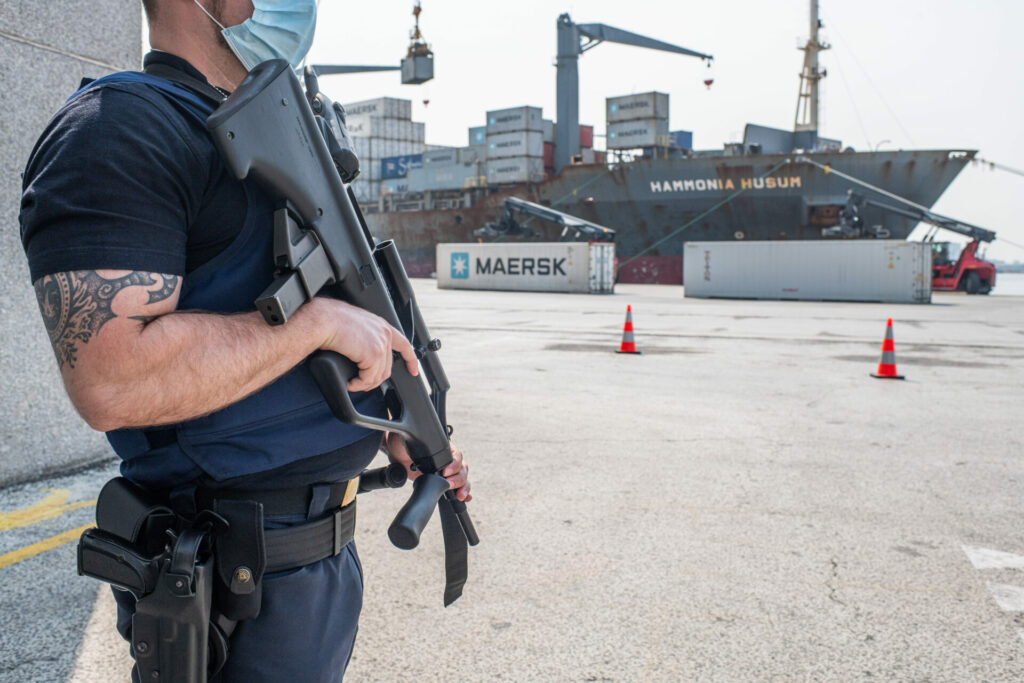The Port of Antwerp-Bruges saw its cargo handling decrease 5.5% from 2022 to 2023. Organised crime is considered the preeminent challenge facing the port, which is central to the economy of Flanders and European supply chains.
The complex geopolitical and economic context already seen in the first quarter of 2023 continued to drive a drop in cargo handling at the port. The total cargo throughput was 271 million tonnes – 5.5% less than in 2022. It is a long time since total cargo handling has fallen.
"The international context remains volatile due to the war in Ukraine but also the fear of the further escalation of conflicts in the Middle East, the inflation in the Eurozone due to the energy crisis," said Jacques Vandermeiren, CEO of Port of Antwerp-Bruges. He added that there is a global decline in international trade in the face of existing barriers and potential risks. Many regions are looking to produce their own key products rather than rely on imports from overseas territories.
"But we remain Flanders' economic engine, one that has held up well in difficult conditions," said Annick De Ridder, Vice-Mayor of the City of Antwerp and President of the board of directors of Port of Antwerp-Bruges. Vandermeiren expects the figures of other Belgian ports to be worse.
Reinforcement needed
The port's 2023 annual results were announced in a press conference on Wednesday. But as well as performance figures, authorities took the opportunity to highlight a major problem specific to the port itself – organised crime.
"The pre-eminent challenge for the port is the fight against organised crime," said De Ridder. She noted that this is a federal competence, overseen by the Federal Police and the public prosecutor's office, who she stressed urgently need reinforcement. "We have been insisting on this point for a long time. This will hopefully arrive soon but it can't come soon enough."
The port has for some time been the continent's cocaine hub. Every month, many tonnes of the drug are seized by port authorities. A recent investigation showed it has become the preferred point of entry for Colombia's biggest drug cartels to exploit the European market. It highlighted increasingly innovative steps that are taken to ensure the illicit trade evades attempts to stop it.
Port workers are now being targeted by criminals, who increasingly engage in violent measures to regain intercepted cargoes. For this reason, efforts were stepped up to ensure drugs can be burned more quickly.
One of the major steps to secure the port is a step is the creation of a dedicated law enforcement team. Training started last year and the team will fight against organised crime linked to drug shipments. The port is also collaborating with the ports of Amsterdam and Hamburg, which face similar problems.

A customs K9 unit using a Belgian Malinois search dog at the Port of Antwerp. Credit: Belga/ Jonas Roosens
Additional measures to improve safety of port workers include a digital container release process – a structural change that followed a detailed (and costly) review of all processes by the whole port community. This will be implemented later this month and will tighten the security around the release of cargo.
Port authorities will also roll out their drone network as well as radar and camera networks, which are fundamental to the daily functioning of a port but can also help in the fight against drugs and contribute to the security in a "complex port environment".
"This issue is like a waterbed, if you repress one point, the surface will rise somewhere else, which is why we have to continue to fight this battle," De Ridder concluded.
Related News
- Over 43 tonnes of cocaine seized in South American ports destined for Belgium
- Belgium to develop 'explosive suitcase' to immediately 'deactivate' seized cocaine
Earlier in the year, the port revealed that freight had been affected by a decline in demand for steel – a major commodity where volume fell 18% in the first six months of 2023.
Fruit remains an important commodity, in particular those in refrigerated containers such as bananas, kiwis, pineapples, melons, citrus fruits, and lychees. These perishables require special attention and handling via dedicated terminals, in order that they can swiftly pass to logistics service providers. The Port of Antwerp-Bruges is Europe's number one point of entry for fruits imported to Europe.
And besides commodities, Zeebrugge welcomed around 200 cruise ships over the course of 2023, totalling over half a million passengers. Although the number of passenger ships calling at the port has dipped, authorities noted that the size of the ships is growing.

